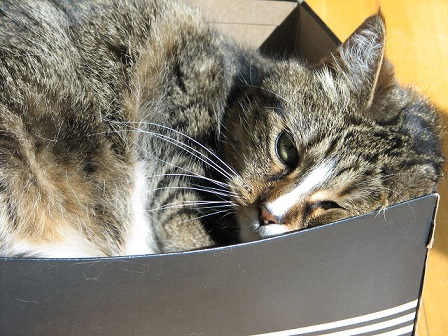Why Do Cats Like Empty Boxes?
Buy your cat a toy, a climbing tree made specifically for cats, a new bag of cat food shipped to your home or anything that comes in a box the size of which is a bit smaller up to quite a bit larger than your cat. Odds are your cat will forego the gift and climb in the box. Why do cats seem to get such enjoyment from empty boxes? Just what is it about cats and small confined spaces? And of course it's not limited to cardboard boxes, specifically. Give a cat a plastic storage bin, an old purse, an empty or semi-empty container of any sort large enough to comfortably hold the cat and chances are he or she will climb in if left undisturbed.
Experts tend to agree on several reasons why cats love boxes and other small containers. However, no one can say for sure until the cats tell us directly and I don't foresee that happening anytime soon.
 Scientists believe the main reason cats like to climb into empty boxes is for security. Joseph Castro, writing for Live Science calls it an instinctual behavior. He writes that hiding in confined spaces allows a cat to simultaneously stalk prey while hiding from predators. That makes sense. But it's still all just educated speculation, trying to know the mind of a cat.
Scientists believe the main reason cats like to climb into empty boxes is for security. Joseph Castro, writing for Live Science calls it an instinctual behavior. He writes that hiding in confined spaces allows a cat to simultaneously stalk prey while hiding from predators. That makes sense. But it's still all just educated speculation, trying to know the mind of a cat.
Maybe cats are just lazy and empty boxes make cozy beds. Maybe sleeping in a small space brings comfort like sleeping in the mother's womb. Maybe cats just like to keep us flabbergasted trying to figure out why they do what they do.
Dr. Stephen Zawistowski, science adviser to the ASPCA, says in a Business Insider interview that cats love boxes because they're cryptic animals, because they like to hide. Zawistowski echoes the sentiment that boxes provide cats with a sense of security. When a cat climbs inside, the box then becomes a small fortress because it often has only one way in and one way out. This prevents us or the family dog from sneaking up on the cat. However, this hiding spot provides the cat with an advantage. She can hide and suddenly lunge out at passersby. Cats seem to get great pleasure out of this and whether it's mock-prey or not, I'm not sure.
I'm certain most cat owners have been surprised at one time or another when walking by a box or other container when your cat suddenly jumps out from seemingly nowhere. That's happened to me many times in my life. Today when I put a cardboard box out by the bin to be recycled, just in a short time one of the semi-feral cats that hangs around my house for food will be hunkered down in the box. Often he or she will remain in the box for hours and as soon as one cat leaves the box, another will go in for a turn.
Researchers at Utrecht University in the Netherlands conducted a study on shelter cats. One group was provided with boxes to hide in. A second group was not. The results of the study clearly showed that the group given boxes adjusted much more quickly to the new environment than the group that did not have a convenient hiding spot. Obviously, the sense of security the "boxed" cats felt reduced stress. Thus, we know boxes can be good things for some cats.
Some experts also believe a cozy hiding place reminds cats of the comfort and security of snuggling with a mother cat and litter mates from "kittenhood." This too, makes sense to me. Cats are nesters and the defined walls of an empty box provide a ready-made structure for nesting.
Okay, so now I understand the box stuff. Now how does that apply, or does it, to the circles drawn on the floor that cats seem to like? Remember a few years ago when photos of cats that refused to leave circles and squares drawn on the floor were all over social media? The cats were not hiding. The outlines provided no shelter to speak of. I remember seeing one photo of a cat resting comfortably in a square outlined in duct tape on the floor. Researchers believe these outlines are a substitute for the defined container. Just a marked territory of sorts, I suppose.
As mentioned above, we'll never really know when it comes to cats. But, I must say their behavior remains fascinating.
Any ideas?
References:
Applied Animal Behaviour Science: Will a Hiding Box Provde Stress Reduction for Shelter Cats?
Business Insider: Here's Why Cats Love Boxes So Much
LiveScience: Why Do Cats Like Boxes?
